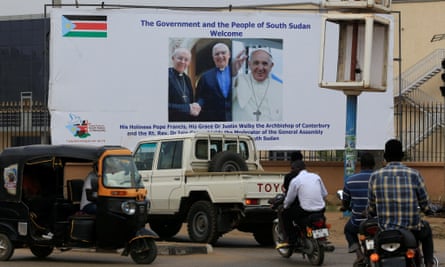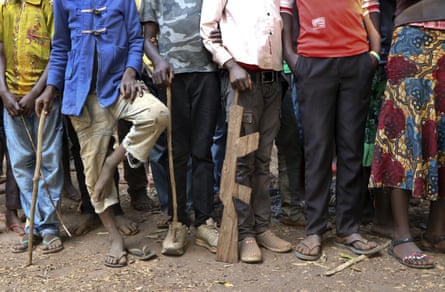The British government’s financial support for Ukraine must not be at the cost of aid to other areas of the world in crisis, three faith-based charities have warned, on the eve of an unprecedented joint pilgrimage to South Sudan led by Pope Francis.
The organisations are calling on the government to restore the 59% cut in the UK’s aid budget to South Sudan, and invest in peacebuilding, conflict management and reconciliation.
Their demand is supported by a new opinion poll that shows more than half (53%) of the British public agree the UK should be a leader in providing humanitarian aid in countries facing conflict.
The pope, along with Justin Welby, the archbishop of Canterbury, and Iain Greenshields, the leader of the Church of Scotland, will arrive in South Sudan’s capital, Juba, on Friday for a three-day visit they have called a “pilgrimage for peace”.
They will meet President Salva Kiir as well as bishops, clergy and people displaced by fighting.

The ecumenical visit was due to take place last July but was postponed after the pope was advised by doctors not to travel.
South Sudan officially split from Sudan in 2011, but civil war erupted two years later after a political struggle between Kiir and the then vice-president, Riek Machar. The conflict has claimed almost 400,000 lives and displaced millions. Despite numerous peace deals, violence continues, and the country is also experiencing severe flooding and localised drought.
In an open letter to the UK prime minister Rishi Sunak, the leaders of Christian Aid, the Catholic aid charity Cafod and the international Christian relief charity Tearfund point to South Sudan’s growing hunger crisis. About 7.7 million people – 54% of the population – are already living with crisis-level food insecurity.
“The current situation in South Sudan partly reflects disengagement by the international community at a time when the war in Ukraine is holding diplomatic and donor attention,” the letter says.
“While the UK government’s support to Ukraine is commendable, it must not come at the cost of support to other areas of the world that are affected by crises, including South Sudan and the wider east African region.”
Patrick Watt, Christian Aid’s chief executive, said: “With this unprecedented ecumenical pilgrimage, there is a real opportunity to shine a light on South Sudan and give hope to people in need in the region.
“It is clear the British people agree the UK government should recommit funding and provide diplomatic support to the fragile peace process. This must include investment in community-level peacebuilding and reconciliation.”

Christine Allen, the director of Cafod, said: “The people of South Sudan have suffered so much due to conflict and instability. But instead of being able to rely on the support of the UK, each year the government has cut its funding. Our aid budget should prioritise countries impacted by conflict.”
Nigel Harris, the CEO of Tearfund, added: “In solidarity with the global church leaders visiting South Sudan, we urge the UK to use its influence and resources to support the role of faith leaders in humanitarian and peacebuilding work in South Sudan.”
The poll, commissioned by Christian Aid and carried out by Savanta, found that only 13% of respondents disagreed that the UK should “be a global leader in providing humanitarian aid and peacebuilding in countries facing conflict around the world, such as South Sudan”.
More than one in four (27%) said they neither agreed nor disagreed, and 7% said they didn’t know.

 1 year ago
84
1 year ago
84










 English (US)
English (US)